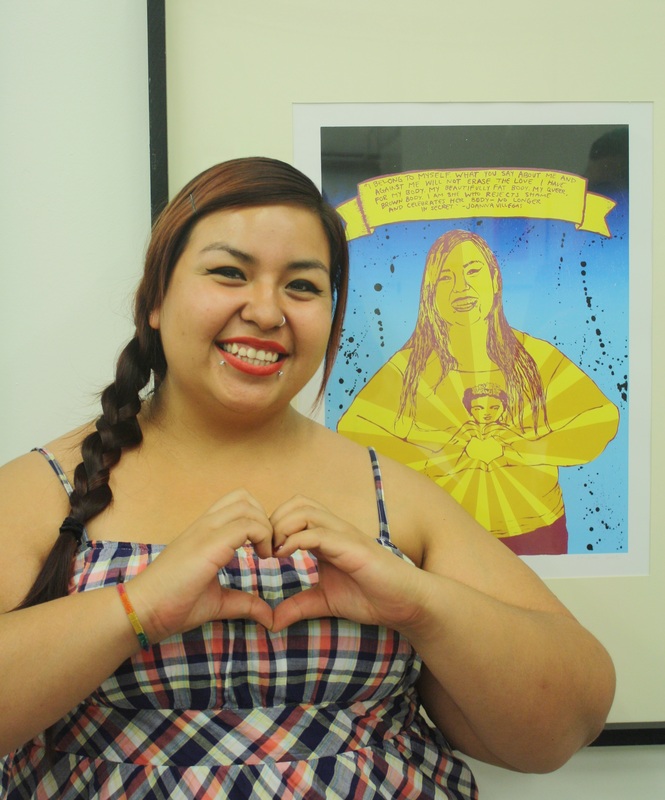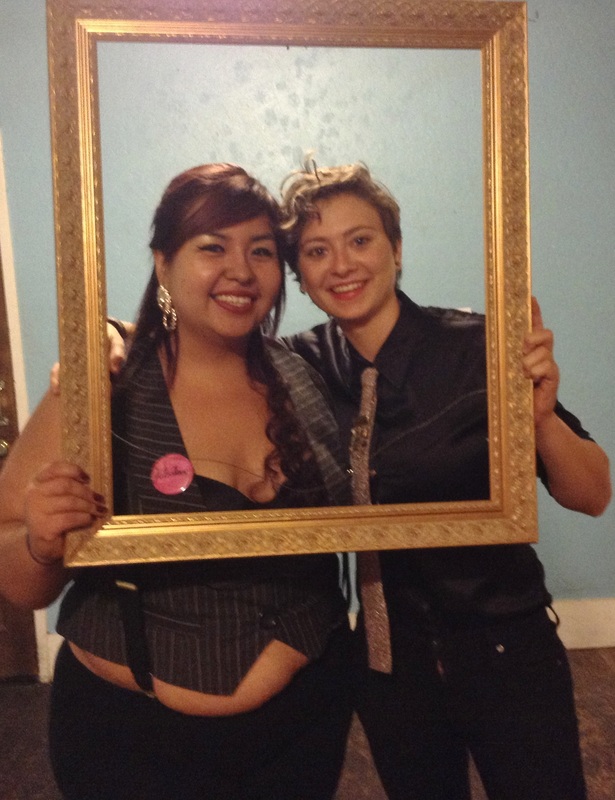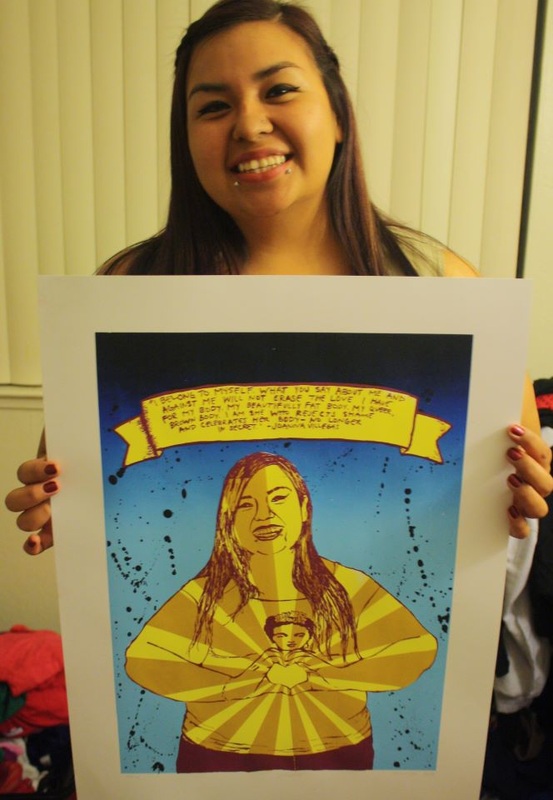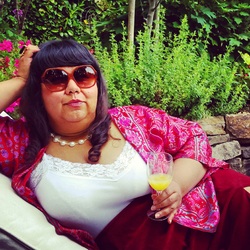|
I met Joanna at the UC Davis Queer People of Color Ball & Mini-Conference in June. She's an undergrad studying English and Chicano/a Studies who's graduating in December. She sent me some of her poetry and I fell in love! She's super brilliant, super cute and super fierce and I thought you should meet her. Virgie: How do you identify and how do you see your other identities intersecting/interacting with your fat identity? Joanna: I am a Queer Chicana born and raised in a low-income community of color called Logan Heights in San Diego, California. My parents are both from Mexico City, with little formal education - but very resilient and amazing people. I am fat and fabulous, always have been - but I didn't always recognize it. It has taken me a very long time to see myself as beautiful. Growing up I was bused into a middle class, predominantly white neighborhood called Point Loma for my k-12 education. I realized at a very young age that my appearance was not desirable. Every single aspect of me was undesirable and I was reminded on a daily basis. My complexion was not light enough, I was not thin/skinny enough, I was not rich enough, and my family was not educated enough. My neighborhood had more access to liquor stores; grocery stores were few and with limited food options. Children were likely to be taking care of their siblings while their parents were off working - out of necessity. Families are likely to shop for groceries according to price versus wholesomeness.The inaccessibility to quality and affordable food, holistic education, and stable employment has shaped my experience and my perception of self. I grew up failing to understand how my identities intersected and were rooted in systems outside of myself - but I grew up blaming myself for being fat, for being "uneducated", and wondering why we were always struggling. I have recently come to an understanding about my experience as a low income fat femme queer chicana; I control my own body, even when I cannot, to the same degree, control my reality and experiences. I choose to be happy, shameless and always celebrate my body and my mind - everything that makes up who I am. Virgie: One of the things we talked about in my workshop at the QPOC Conference was the way that marginalized communities create "armor," and how we use fashion or makeup or attitude to resist and cope with that marginalization. For me, that armor is my femme fashion and my uppity attitude. What is your armor? Joanna: My armor is my chola style winged eyeliner. Some people call it "cat eyes" and others mock me because the wing is too far out for their liking. I actually began using eyeliner in middle school - 8th grade to be exact. My sister applied it because I was going to take star shots with a group of friends. Star shots are pictures teenagers used to take at the mall. You'd get wallet size pictures and you could give them out to your friends. I remember being so excited because 1) I finally got to wear make up - something my young mind recognized as a sign of growing up and 2) the affirmations that my friends would give me for wearing it. It was appreciated among my friends. My community is known for all of its previous gang activity. It was in some way traumatic to be surrounded by that lifestyle but gang life is a separate conversation of its own. It shaped my experience growing up, and while I wouldn't say I was a chola, I grew to appreciate the people that were much more involved. I feel as though I recognize this aspect of my community, and while violence is not something to be celebrated, those folx have created their own version of resistance against the many forms of systemic violence against their bodies. I feel as if wearing my eyeliner keeps me connected to my community. It makes me stand out in academic spaces, spaces like UC Davis and the city of Davis which is primarily white folk. My eyeliner reminds me where I came from, where I must return, who I love, it reminds me of those that keep me motivated. It is a source of empowerment. Virgie: What do you as a young qpoc (queer people of color) need/want from fat activism/community?
Joanna: Embracing my queerness has allowed me to embrace my fat body as beautiful. It took 21 years and moving to Davis for me to have a space to discuss issues pertaining to queer bodies. I feel as though communities like mine, low income communities that don't have spare time, don't have access to the education that will allow them to contextualize their reality, aren't taught to celebrate themselves, love themselves even though there are multiple ways in which a person can love themselves. For that reason, I'd like more visibility. My answer is simple but difficult to attain. I didn't know there was such a thing as a fat activist or a fat community. I was self loathing for several years. I had never seen, much less entered queer spaces for many many years. I was repressing my thoughts and withholding my questions for several years. Events that I have been exposed to through academia, such as conferences, retreats, and community dialogue spaces are closed off from specific communities and groups of people that don't have the economic stability, the education, the language; the resources to find those spaces. I want visibility and accessibility for these communities. I acknowledge that it takes a lot of individual action to empower a collective - but the reward comes when that collective is empowered and self-loving. ------------------------------------- Yeah. Joanna is pretty fucking amazing. Ghurl, I told you! Below is one of her poems, "I Slip Into the Tub." Want to send her love or a graduation present (yeah you do)? Find her on Facebook or write me: [email protected]. I slip into the tub Pero despacito I watch the water rise Cuando entran mis piernas Redondas Gorditas Half way in Half way out I sit caressing the body everyone is afraid to love -- I stand in fear Afraid Of my reflection I stand in fear Of my longitas And smile When I see That my reflection fits in the mirror --- In crowds I look around the room and find the easiest way for this luscious body To sneak Through the crowd To spare myself The scoff that comes When my fat hips My Big arms Rub up against someone --- I hear my abuela now “Ay Mi gordita Ya no comas mucho” And my tio “Estas bien chula mija Pero te verias mejor si pierderas peso Si te quieres tienes que perder peso” They felt I could not be beautiful And fat. I believed it. --- I look at the chair Before I sit I look at the width of a table Before I choose my place I make sure I will not make you uncomfortable When you sit next to me For dinner --- On the bus I take up More than one seat But less than too So I set my backpack Next to me Hoping you will not laugh --- At home I talk to my tummy The only one that understand me The one that knows My tears My voice Of hate My story I comfort it And rub it To show it the love no one else can --- I protect you From my fat And I protect myself From your bullshit. I wear my sweater And I wear your shame. I carry your uncomfortableness And maybe I carry your self-esteem. But when I remove my sweater I remove my fear --- I click away Taking pictures Of a body I grew up shaming And I share its beauty I share my love I share My fat queer body. And know that it does not define me But it is a part of me I can no longer hide To make you feel comfortable in my presence It is mine just as much as my thoughts, goals, desires, and dreams So when you see me You should know all of me So when you know me I hope you will love all of me. --Joanna Villegas
Tobi
7/31/2013 09:35:01 am
That was an awesome read, you go girl!
LaEspanola
8/3/2013 03:46:03 pm
Those top three poem gave me that twing in the stomach, like when you hear an incredible song for the first time that makes you burst into tears, or when the sunlight hits the countryside in a certain way at dawn that gives you goosebumps. Simply Beautiful. Comments are closed.
|
Virgie Tovar
Virgie Tovar, MA is one of the nation's leading experts and lecturers on fat discrimination and body image. She is the founder of Babecamp (a 4 week online course focused on helping people break up with diet culture) and the editor of Hot & Heavy: Fierce Fat Girls on Life, Love and Fashion (Seal Press, 2012). She writes about the intersections of size, identity, sexuality and politics. See more updates on Facebook. Archives
April 2021
Categories
All
|






 RSS Feed
RSS Feed